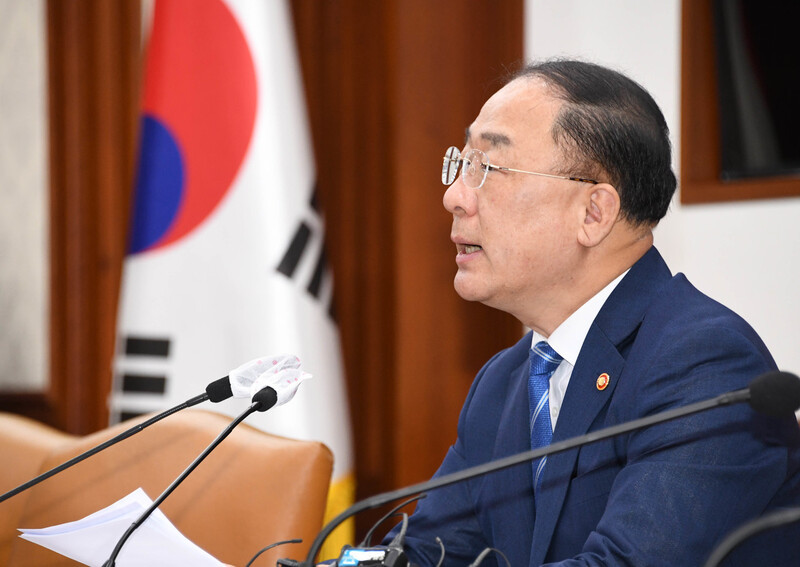Korea to strengthen inspection of illegal property transactions
By Kim Young-wonPublished : Aug. 12, 2020 - 17:19

The South Korean government said Wednesday that it will soon announce the results of its inspections into illegal transactions involving expensive real estate in Seoul and the surrounding areas.
“Having tracked transactions of expensive houses reported earlier this year, state agencies found some irregularities, and the government will announce the final results in August,” said Deputy Prime Minister and Finance Minister Hong Nam-ki at a meeting with related ministers.
“The tax authorities will review abnormal transactions and levy fines on those involved.”
Despite the government’s survey of average housing prices across the nation, which have supposedly stabilized, apartment prices and rents in the capital and nearby cities have continued to surge this year.
Because of the government’s latest regulations, which include higher property tax rates and a 5 percent cap on increases in “jeonse” deposits, housing prices are rising as owners are increasing listing prices to make up for expected losses.
The jeonse system, which is unique to Korea, allows tenants to pay a lump-sum deposit in lieu of monthly rent for a term that normally lasts two years. Under the legislation that recently passed, jeonse tenants can unilaterally extend their leases for another two years after the first lease expires, and the deposit can increase no more than 5 percent. The laws are expected to go into effect this month.
The prime minister also said the police and tax authorities will beef up their efforts to crack down on illegal property transactions and tax evasion, especially in the Greater Seoul area and the administrative city of Sejong. This month, the housing market in Sejong heated up as plans to move state agencies there from the capital gathered momentum in the National Assembly.
Despite the overheated property market, recent data from the International Monetary Fund suggested that real estate prices in Korea grew only moderately. The rise in housing prices from the fourth quarter of 2018 to the third quarter of 2019 came in at 1.2 percent, placing Korea 37th-highest among 63 nations, the IMF statistics showed.
The Philippines, Portugal and Latvia were the top three nations on the list, with their home prices having increased 20 percent, 10.5 percent and 10.4 percent, respectively.
Germany, France and China saw their average home prices grow 3.4 percent, 2.3 percent and 2.3 percent, respectively, while the figure for the United States stood at 1.6 percent.
But some market watchers question the figures for Korea, as they reflect prices for different types of dwellings, including multifamily homes and studio apartments.
Apartments are the most sought-after type of housing and the main culprit of skyrocketing housing prices here in the past years. Data from private property information firm Real Estate 114 showed that apartment prices grew 3.2 percent nationwide and 6.1 percent in Seoul during the same period.
By Kim Young-won (wone0102@heraldcorp.com)





![[From the Scene] Monks, Buddhists hail return of remains of Buddhas](http://res.heraldm.com/phpwas/restmb_idxmake.php?idx=644&simg=/content/image/2024/04/19/20240419050617_0.jpg&u=20240419175937)




![[Graphic News] French bulldog most popular breed in US, Maltese most popular in Korea](http://res.heraldm.com/phpwas/restmb_idxmake.php?idx=644&simg=/content/image/2024/04/18/20240418050864_0.gif&u=)



![[From the Scene] Monks, Buddhists hail return of remains of Buddhas](http://res.heraldm.com/phpwas/restmb_idxmake.php?idx=652&simg=/content/image/2024/04/19/20240419050617_0.jpg&u=20240419175937)

![[KH Explains] Hyundai's full hybrid edge to pay off amid slow transition to pure EVs](http://res.heraldm.com/phpwas/restmb_idxmake.php?idx=652&simg=/content/image/2024/04/18/20240418050645_0.jpg&u=20240419100350)

![[Today’s K-pop] Illit drops debut single remix](http://res.heraldm.com/phpwas/restmb_idxmake.php?idx=642&simg=/content/image/2024/04/19/20240419050612_0.jpg&u=)